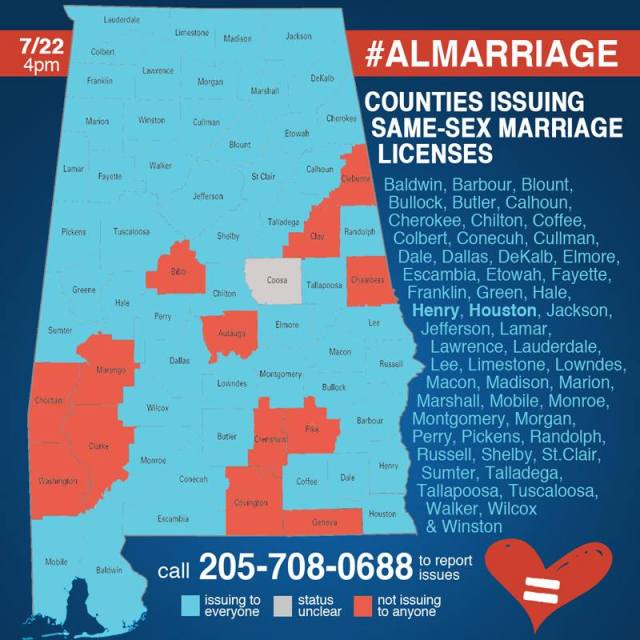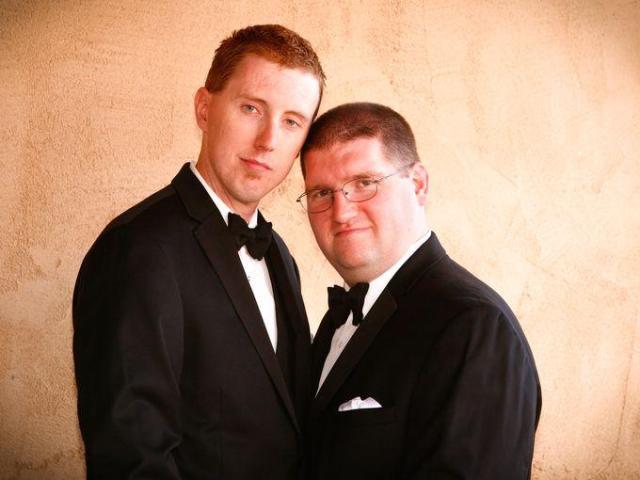Feature image courtesy of Hali Felt and Jennifer Kenney
On June 26th, people in same-sex and queer couples and their allies celebrated across the U.S. upon learning the Supreme Court had formally legalized marriage equality.
But for some folks, the celebration rang a bit hollow.
“It was like we were living in this alternate reality, where the north was celebrating and down here in the south we were wondering what the fuck was going on,” said Hali Felt. She and her partner Jennifer Kenney went to the courthouse in their home county, Tuscaloosa County Alabama, on that historic Friday, and their application for a marriage license was soundly rejected.
“We knew going in that we weren’t going to actually get the license on Friday but we wanted to go because we felt it was important to push,” Felt said. “When we actually got the ‘no,’ we underestimated how it would feel emotionally. It was a humiliating experience.”
Felt and Kenney kept fighting, and on July 1 their county began issuing marriage licenses to all couples.

But six weeks after the ruling, 13 of Alabama’s 67 counties are refusing to issue licenses to any couples — a move that is technically legal, because current Alabama law states probate judges “may” issue marriage licenses, not that they “shall.” A bill has been put forth to change that.
Equality Alabama board chair Benjamin Newbern notes that while these counties are not legally discriminating, “they are doing a huge disservice to their constituents and losing tens of thousands of taxpayer dollars.”

Other southern states, including Louisiana and Mississippi, were vocally resistant to adopting the new law of the land. And in Texas, two of its 254 counties — Hartley and Irion — continue to indicate that they will not comply with the ruling. No one in those counties has applied for a license, according to Equality Texas. In Kentucky, Rowan and Casey counties are still discriminating. The result of a lawsuit in Rowan County is expected next week, while no suit has been filed in Casey County, according to Freedom to Marry.
Even if the numerable impact of Southern counties’ refusal to comply seems small, the symbolism is huge to Southern couples. Legal change does not necessarily equal cultural shift, and for every Southern county that is still non-compliance, there are dozens more where county clerks are reticent to provide licenses, where married queers have neighbors and co-workers who harass them instead of celebrate with them.
Discrimination continues even in death, like in the Texas case of a man who wanted to update his husband’s death certificate and was initially denied. John and James Stone-Hoskins married lawfully married in New Mexico last year, but when James died in Texas in January, the state refused to recognize John as the surviving spouse. A judge has now ordered that the certificate must be corrected.

These failures are indicative of broader cultural resistance to fully incorporating LGBT and queer people into all areas of the law and public life. In Alabama, “LGBTQ people are not a protected class. People can get married on Sunday and fired on Monday in Alabama,” said Susan Watson, the executive director of the American Civil Liberties Union of Alabama. In the south, LGBT individuals and couples are more likely to face housing, employment and healthcare discrimination, experience high rates of violence, and have low rates of access to social and community services designated for their needs.
Felt and Kinney, who moved to Tuscaloosa about a year ago from Pennsylvania, said they were lucky to find a lot of support in their neighborhood and from their employer, the University of Alabama, where they are both professors. They celebrated with a potluck wedding on their front porch — “We wouldn’t be relegated to the backyard,” Kinney said — and were featured in the newspaper with a positive story. Friends and strangers have been encouraging.
“Like, a woman was walking her dog and said was that you in the newspaper? You go girls!” Kenney said. “I don’t think we’ve had any negative interpersonal interactions, it’s all just been systemic sluggishness.”
That systematic sluggishness is still affecting people in Alabama and throughout the South who wish to exercise their legal right to marry, and it’s important to recognize and combat that inequality.








Comments
Glad to hear that they haven’t faced much negativity in their interpersonal relationships. After coming out to some close friends of mine in the south I was told that “They wouldn’t be in attendance because they could not condone that behavior.”
After finally watching The L Word: Hate the Sin (ugh it bugs me that The L Word franchise name is attached to that documentary), I am really interested to hear more from queer ladies in the south about how things are going for them post-June 26. Have things changed at all? Are they any better?
Georgian resident here to answer your question! My girlfriend and I live an hour outside of Atlanta in a fairly liberal city (college town) so keep that in mind. We’re out to all of our friends and family and everyone was elated the day of the decision. I actually remember little to no negativity on my Facebook timeline that day. Depending on where you are in the south will determine how comfortable you feel. In Atlanta or around where we currently live we feel fine being public. If we go to a more “country part” (say, middle Georgia) then we would not be public. However, as far as the decision I can say its personal impact was larger than anything. Always having to consider where you can be out here in the south and constantly being careful (we can still be legally fired for being gay) gets frustrating, but I remember the moment I heard the decision I felt normal after years of feeling like an outlier where I live. I knew there was nothing wrong with us, but being recognized on such a large scale, one that is above the small minds we live around, took such a large burden off of me that I didn’t even realize I was carrying until that moment. Having my friends ask when the wedding will be made me feel like any other couple. It had such a positive impact that was even a bit hard to comprehend for my girlfriend. When I told her we could go to the courthouse and get married right at that moment, anywhere in Georgia, it hit her then that we were a “regular” couple. So while we still have to be careful in certain areas around here, the decision still helped us have a peace of mind.
Thanks for this article, I hadn’t heard about how things were playing out in the south since shortly after the ruling so it was good to have an update. Here’s hoping this gets resolved quickly… and that we get more non-discrimination laws in place for employment, housing, etc.
Whoa, I did not expect to see my current (but temporary) home of Tuscaloosa on Autostraddle. Roll tide?
Thank you for this! I live in Alabama, and while my county (Montgomery) started giving out licences around 1pm on the 26th it is still a struggle in the surrounding counties. It’s been annoying to hear friends in the north dismiss marriage as a fight that is over, when it isn’t here.
In good news though, my friend’s lawsuit about the recognition of his marriage has been settled. (http://www.al.com/opinion/index.ssf/2015/08/four_years_after_losing_spouse.html#incart_most-comments)
So excited to see an article about Tuscaloosa, my new home, and UA (Roll Tide!), but also saddened to see them in this context. It is true that in the categories of bigotry and narrow-mindedness, the deep South can and does lag behind some other areas of our country. But there is a fighting minority of progressives and we are constantly campaigning to defend the rights of all. Instead of giving more attention to the conservative judges who stopped giving out licenses, we should be talking about my friend Colin who spent several days marrying couples outside the courthouse after the licenses finally began being granted. Or my friends in Spectrum and QTPOC, our small but active clubs for queer folks. Or the UA College Democrats, who have already begun to prepare for events and canvassing to spread the word about local, state, and national progressive politicians. It’s easier to vilify the decisions made by these Southern politicians, but we should do everything we can to look at the progress that these voices of protest have made.
Hi Alison! I agree with you, but it is also important to acknowledge that people’s rights are still being violated in the south and also honor the people who are pushing back against that. My goal definitely wasn’t to villify the south — I’m a Texan myself. Thanks for everything you are doing for Southern queers!
I guess it really does take some people in the south longer to learn and evolve with civilization. It must be that heat down there! :>)
The fight isn’t over. At least once a month I have a couple that gets married Florida instead of trying in their home state. It shouldn’t be that way at all. It is legal in all 50 states yet there is stigma, judgment and fear still out there. I feel so sad that even after they elope they cannot share their joy for fear of losing their jobs.